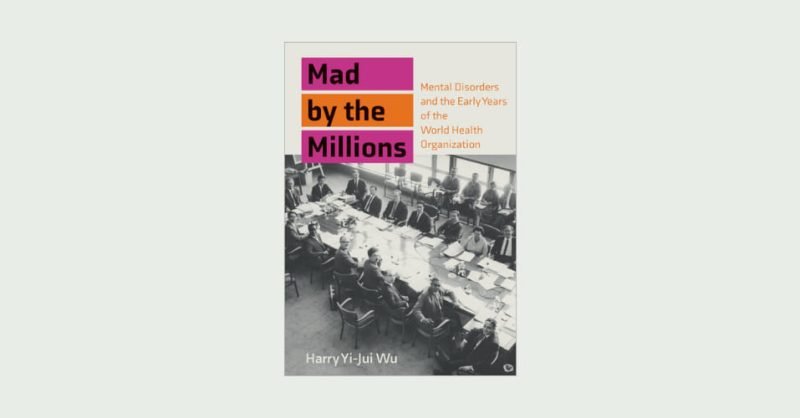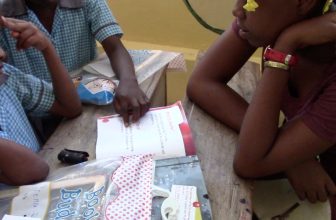
Mad by the Millions: Mental Disorders and the Early Years of the World Health Organization by Harry Yi-Jui Wu (MIT Press: 2021)
Harry Yi-Jui Wu’s Mad by the Millions traces the early efforts of the World Health Organization (WHO) to bring psychiatry into the domain of global public health. Drawing on extensive archival materials, Wu reconstructs how psychiatrists, epidemiologists, and social scientists collaborated to create standardized classifications, conduct multinational studies, and articulate a universal vision of mental health. He situates these initiatives in the postwar pursuit of “world citizenship” and the belief that scientific progress could help secure peace. By following the WHO’s International Social Psychiatry Project from its rise to its decline in the 1970s, the book shows how global mental health emerged as both an ambitious ideal and a contested practice.
The book proceeds chronologically from the late 1940s to the 1970s, examining ideas, experts, and technologies. Early chapters describe how the rhetoric of world citizenship informed WHO’s commitment to psychiatry. Later sections focus on diagnostic standardization, the recruitment of psychiatrists across regions, and the use of recording technologies for cross-cultural comparison. These initiatives culminated in the development of the psychiatric chapter of the International Classification of Diseases (ICD), but also revealed tensions between universal claims and local differences. By the 1970s, methodological doubts and Cold War geopolitics had produced widespread disillusionment, foreshadowing debates that continue to shape global mental health.
From a clinical perspective, Wu’s discussion of “incomplete decolonization” is particularly compelling. He shows how psychiatrists from outside the West, including Taiwan’s Tsung-Yi Lin, were brought into WHO projects yet remained constrained by colonial legacies and Geneva’s authority. This resonates with Taiwan’s later exclusion from the WHO, which rendered the island nearly invisible in the realm of global health (Shuchman, 2019). Yet exclusion did not result in silence. Taiwanese psychiatry pursued academic legitimacy through biomedical and epidemiological publications closely aligned with Western paradigms, as illustrated by large-scale initiatives such as the Taiwan Biobank (Feng et al., 2022). As a practicing psychiatrist, I see this as a form of self-colonization: an effort to secure recognition by adopting external standards, even at the cost of distancing psychiatry from local cultural realities.
This dynamic continues to shape clinical and academic life. The ICD and the Diagnostic and Statistical Manual of Mental Disorders (DSM) categories dominate diagnostic language, even when they fail to capture culturally embedded expressions of distress. Research priorities emphasize neurobiology and large-scale surveys, while qualitative and culturally sensitive approaches remain marginal. Patient voices rarely enter the international conversation, echoing the silences in Wu’s archival record. Taiwan’s case illustrates how global hierarchies may be internalized: exclusion from formal structures can paradoxically reinforce conformity to prevailing norms, while leaving questions of cultural responsiveness unresolved.
Mad by the Millions succeeds as both institutional history and provocation. Wu demonstrates how universalizing projects repeatedly obscured cultural difference, while also showing the contingencies that shaped psychiatry’s globalization. The book’s strength lies in its careful reconstruction of the WHO’s ambitions and limitations, though its focus on experts necessarily sidelines patients and local clinicians. By illuminating the interplay of science, politics, and culture in the mid-twentieth century, Wu’s study enriches our understanding of global mental health history and raises enduring questions about the balance between universality and cultural particularity.

References
Feng, Yen-Chen Anne, Chia-Yen Chen, Tzu-Ting Chen, Po-Hsiu Kuo, Yi-Hua Hsu, Hwai-I Yang, et al. 2022. “Taiwan Biobank: A Rich Biomedical Research Database of the Taiwanese Population.” Cell Genomics 2 (11): 100197. https://doi.org/10.1016/j.xgen.2022.100197
Shuchman, Miriam. 2019. “How Exclusion from the WHO Is Affecting Health Care in Taiwan.” Canadian Medical Association Journal 191 (31): E872–E873. https://doi.org/10.1503/cmaj.109-5778







